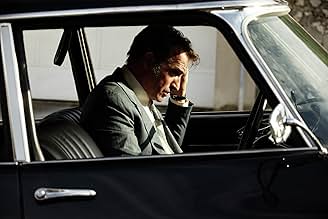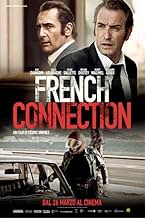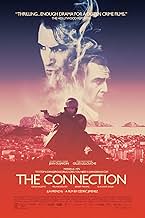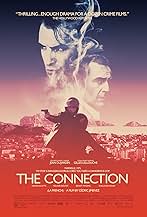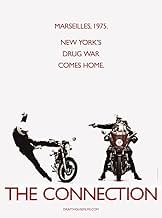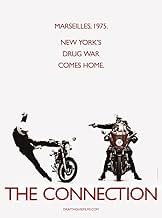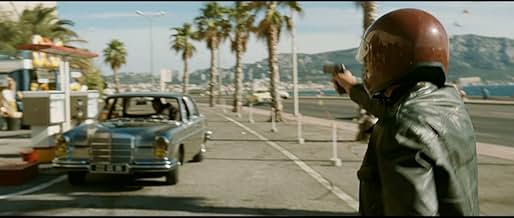AVALIAÇÃO DA IMDb
7,1/10
13 mil
SUA AVALIAÇÃO
Um magistrado da polícia francesa passa anos tentando derrubar uma das mais poderosas redes de tráfico de drogas do país.Um magistrado da polícia francesa passa anos tentando derrubar uma das mais poderosas redes de tráfico de drogas do país.Um magistrado da polícia francesa passa anos tentando derrubar uma das mais poderosas redes de tráfico de drogas do país.
- Prêmios
- 2 vitórias e 5 indicações no total
- Direção
- Roteiristas
- Elenco e equipe completos
- Produção, bilheteria e muito mais no IMDbPro
Avaliação em destaque
If I could only recommend you go and see one film this year, The Connection would be it.
The film follows the true story of the rise and fall of Pierre Michel "The Judge", played by The Artist's Oscar winning Jean Dujardin, against the Marseillaise mafia gang The French Connection in the 1970s. The story had already been put to cinema in The Judge (1984), but this time the story's been redone much more ambitiously.
It's a typical good guy versus bad guy story, but it's the bells and whistles in this film that really make it so much more than that. The director achieves the perfect combination of action, drama, comedy and tragedy with the irrepressible Mediterranean sun beating down on every day time scene in the film. The Mediterranean settings give the film a sense of glamour and surrealism, juxtaposing the surreal nature of life as a successful drug trafficker in the 1970s, passing time between seaside villas and the biggest nightclub in Marseille.
This is film making at its best - it's as if the screen writer and director Cédric Jimenez pulled out an old school book of film making craft written in the 1970s and followed all the old rules to perfection to bring about not only a brilliant piece of cinematic entertainment, but also of art. This film is a living, breathing and intimate nostalgic reinvention of the 1970s and a just and accurate portrayal of a real gangster story, with some liberties in representing the character's private lives.
Cédric Jimenez grew up himself in Marseille in the 1970s and says that the story of the Judge has run through his veins his whole life. He has wanted to make this film as long as he has wanted to be a film maker, starting his career initially as a documentary maker. He chose to shoot the whole film with a hand held camera, which gives the film it's intimate and raw feeling.
It is an absolute viewing pleasure to be immersed back into the 1970s era and the sets and costumes have been rendered to perfection, to every last detail. The velour furniture, the dingy nightclubs, the glamorous dresses and old style police surveillance technologies are a delight to rediscover. The cowboy style of policing in the 1970s makes the action scenes much more exciting than anything depicting the risk-averse 2000s - the only person in the film wearing even a bullet proof vest is the gang leader Gaëtan "Tany" Zamper (Gilles Lellouche).
There are countless unforgettable scenes in this film, the dialogue is witty, the action is edgy and the acting is superb. Another highlight is the film's soundtrack featuring endless classics from the 1970s (Blondie, Kim Wilde and the Velvet Underground) and tunes by composer Guillaume Roussel that reflect the film soundtracks of the time (for example, his tune Meurtre de fou). It can be tough to watch a sub-titled film for 2h15min, but believe me it's worth it.
The film follows the true story of the rise and fall of Pierre Michel "The Judge", played by The Artist's Oscar winning Jean Dujardin, against the Marseillaise mafia gang The French Connection in the 1970s. The story had already been put to cinema in The Judge (1984), but this time the story's been redone much more ambitiously.
It's a typical good guy versus bad guy story, but it's the bells and whistles in this film that really make it so much more than that. The director achieves the perfect combination of action, drama, comedy and tragedy with the irrepressible Mediterranean sun beating down on every day time scene in the film. The Mediterranean settings give the film a sense of glamour and surrealism, juxtaposing the surreal nature of life as a successful drug trafficker in the 1970s, passing time between seaside villas and the biggest nightclub in Marseille.
This is film making at its best - it's as if the screen writer and director Cédric Jimenez pulled out an old school book of film making craft written in the 1970s and followed all the old rules to perfection to bring about not only a brilliant piece of cinematic entertainment, but also of art. This film is a living, breathing and intimate nostalgic reinvention of the 1970s and a just and accurate portrayal of a real gangster story, with some liberties in representing the character's private lives.
Cédric Jimenez grew up himself in Marseille in the 1970s and says that the story of the Judge has run through his veins his whole life. He has wanted to make this film as long as he has wanted to be a film maker, starting his career initially as a documentary maker. He chose to shoot the whole film with a hand held camera, which gives the film it's intimate and raw feeling.
It is an absolute viewing pleasure to be immersed back into the 1970s era and the sets and costumes have been rendered to perfection, to every last detail. The velour furniture, the dingy nightclubs, the glamorous dresses and old style police surveillance technologies are a delight to rediscover. The cowboy style of policing in the 1970s makes the action scenes much more exciting than anything depicting the risk-averse 2000s - the only person in the film wearing even a bullet proof vest is the gang leader Gaëtan "Tany" Zamper (Gilles Lellouche).
There are countless unforgettable scenes in this film, the dialogue is witty, the action is edgy and the acting is superb. Another highlight is the film's soundtrack featuring endless classics from the 1970s (Blondie, Kim Wilde and the Velvet Underground) and tunes by composer Guillaume Roussel that reflect the film soundtracks of the time (for example, his tune Meurtre de fou). It can be tough to watch a sub-titled film for 2h15min, but believe me it's worth it.
- miranda-welch-abroad
- 7 de dez. de 2014
- Link permanente
Enredo
Você sabia?
- CuriosidadesThe Gaumont animated opening logo is the 70's one.
- Erros de gravaçãoAn early title card indicates the film taking place beginning in 1975. A shot of a truck being unloaded on a New York dock shows the World Trade Center Twin Towers under construction. The Twin Towers were opened in 1973, with construction completed prior to that.
Principais escolhas
Faça login para avaliar e ver a lista de recomendações personalizadas
- How long is The Connection?Fornecido pela Alexa
Detalhes
- Data de lançamento
- Países de origem
- Central de atendimento oficial
- Idiomas
- Também conhecido como
- The Connection
- Locações de filme
- La Ciotat, Bouches-du-Rhône, França(seaside road)
- Empresas de produção
- Consulte mais créditos da empresa na IMDbPro
Bilheteria
- Orçamento
- US$ 26.000.000 (estimativa)
- Faturamento bruto nos EUA e Canadá
- US$ 190.980
- Fim de semana de estreia nos EUA e Canadá
- US$ 10.335
- 17 de mai. de 2015
- Faturamento bruto mundial
- US$ 12.062.441
- Tempo de duração2 horas 15 minutos
- Cor
- Mixagem de som
- Proporção
- 2.35 : 1
Contribua para esta página
Sugerir uma alteração ou adicionar conteúdo ausente

Principal brecha
By what name was A Conexão Francesa (2014) officially released in India in English?
Responda


















